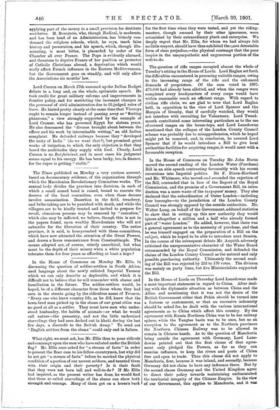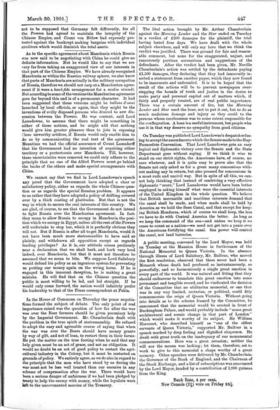In the House of Lords on Thursday Lord Lansdowne made
a most important statement in regard to China. After deal- ing with the diplomatic situation as between China and the Allies, and mentioning that it was not the desire of the British Government either that Pekin should be turned into a fortress or cantonment, or that an excessive indemnity should be asked for, he dealt with the various international agreements as to China which affect this country. By the agreement with Russia Northern China was to be her railway sphere, while the Yangtse basin was to be ours, but as an exception to the agreement as to the Northern provinces the Northern Chinese Railway was to be allowed to remain in Chinese hands. As to the question of Manchuria being outside the agreement with Germany, Lord Lans- downe pointed out that the first clause of that agree- ment only pledged the Powers, as far as they can exercise influence, to keep the rivers and ports of China free and open to trade. Thus this clause did not apply to Manchuria, first, because it was inland, and secondly, because Germany did not claim to have any influence there. But by the second clause Germany and the United Kingdom agree to direct their policy towards maintaining undiminished the territorial integrity of the Chinese Empire. In the view of our Government, this applies to Manchuria, and it was not to be supposed that Germany felt differently, for all the Powers had agreed to maintain the integrity of the Chinese Empire, and Count von Billow had expressly pro- tested against the bankrupt making bargains with individual creditors which would diminish the total assets.







































 Previous page
Previous page